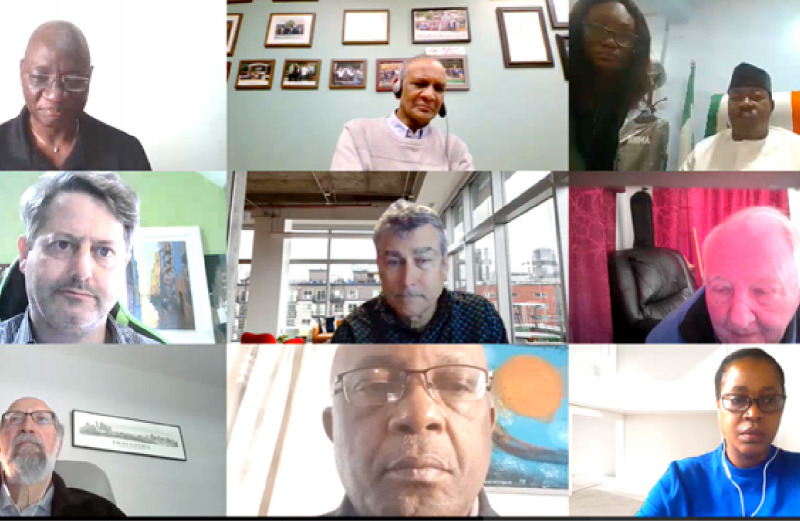Technical Advisory Committee Approves ABNE Annual Reports and Work Plan

From left to right are: Dr. Jeremy Ouedraogo, Head of ABNE, Dr. Karim Maredia from MSU, Dr Rufus Ebegba from Nigeria, Dr. Martin Lema from Argentina, Mr. Lawrence Kent from BMGF, Dr David Keetch from South Africa, Dr. Douglas Buhler from MSU, Mr. Martin Bwalya from AUDA-NEPAD and Ms Betty Kiplagat from Kenya, during the online meeting.
The AUDA-NEPAD African Biosafety Network of Expertise (ABNE) Technical Advisory Committee (TAC) met from June 2 – 3, 2021, to review reports on the first year of ABNE’s Phase III programme and the work plans for second year. The meeting took place online just like in the past year, due to the COVID pandemic and travel restrictions in Africa and overseas.
In his opening remarks Mr Martin Bwalya, on behalf of AUDA-NEPAD management welcomed participants and reiterated the full support of AUDA-NEPAD to the ABNE programme.
“We are very well aware about our responsibilities, and the need to demonstrate real impact in response to the challenges that African countries are having in implementing their national development plan. ABNE is an important flagship with AUDA-NEPAD and when we meet like this, we want to share our views both in what is happening but also how to continue to go forward. We want to have a conversation so that together we continue to deliver very relevant and appropriate responses to the needs of African Union Member States,” he said.
Dr Douglas Buhler, Director of AgBioResearch and Assistant Vice-President of Research and Innovation at MSU highlighted the fact that ABNE was one of MSU high-priority projects. “We are really pleased we can continue to be part of this and provide the necessary support. We all should be proud of what we were able to accomplish despite the COVID-19 situation,” he said.
TAC Chair, Dr David Keetch pointed out that “The current developments happening in the continent on biotechnology and biosafety are very encouraging and the sustained efforts of ABNE staff during Phase I and Phase II programme contributed to this significant progress. Much work is still to be done as we start Phase III and we look forward to further progress and achievements.”
During the two-day meeting, TAC members perused and discussed the report of the Head of ABNE, as well as the detailed Year I report. They also reviewed the Year II work plan and made the necessary suggestions for improvement.
In their final remarks, TAC commended the management and staff of ABNE for the good progress that has been made since the last TAC meeting in 2020 despite the limitations imposed by the COVID pandemic and was pleased to note the continued strong leadership of the Head of ABNE, Dr Jeremy Ouedraogo. They emphasized key recommendations for more impact of ABNE work on the ground, including strong collaboration with other international biosafety services providers in Africa, and a better follow-up and support for the regulation of new breeding techniques initiatives in the various African countries.
Seven TAC members participated in the meeting, including Dr David Keetch from South Africa, Chair of the Committee, Ms Betty Kiplagat from Kenya, Mr Lawrence Kent, from Bill and Melinda Gates Foundation, Dr Douglas Buhler from Michigan State University, technical partner of the programme, Dr Martin Lema, External Expert from Argentina, Dr Rufus Abegba from Nigeria, and Mr Martin Bwalya representing AUDA-NEPAD. The eighth member, Dr Mahama Ouedraogo from African Union Commission could not join the meeting due to other continental urgent duties.
In response to TAC comments, Dr. Jeremy Ouedraogo thanked the TAC for their positive feedback and guidance and acknowledged the great contribution and commitment of ABNE staff that were instrumental to the successes and achievements on the ground. He pledged to continue the hard work with the team and take account of TAC’s suggestions toward achieving greater results.



